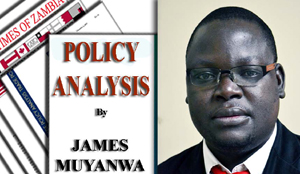 TODAY, we feature an edited version of an article authored by two economic experts from the Zambia Institute for Policy Analysis and Research (ZIPAR).
TODAY, we feature an edited version of an article authored by two economic experts from the Zambia Institute for Policy Analysis and Research (ZIPAR).
In the latest ZIPAR quarterly publication, SHEBO NALISHEBO and MALINDI MSONI write that:
The Zambian Government has to-date issued three Eurobonds: one worth US$750 million in 2012, another for $1 billion in 2014 and $1.25 billion this year.
While eurobond issuances present several potential benefits for the country, notably increased financing for infrastructure development, they also expose the country to significant risks.
Because they are denominated in US dollars, eurobonds are susceptible to losses resulting from adverse fluctuation in the exchange rate, commonly known as currency risks.
The Kwacha has continued to depreciate against the US dollar, falling by more than two-thirds since January.
Managing the risks arising from the Kwacha depreciation is crucial but one way in which the Zambian Government can manage currency risks is through derivatives.
Derivatives markets offer important opportunities for Governments to reduce the losses resulting from negative movements in exchange rates.
As its name suggests, a derivative is a financial instrument that derives its value from the value of an underlying asset, such as equities, foreign currencies and commodities.
The value of a derivative instrument is then determined from the corresponding equity prices, exchange rates or commodity prices.
Derivatives allow investors to protect their investments against currency risks – this is what is known as “hedging.”
There are several derivative instruments that public debt managers can use to reduce the currency risk exposure of Government portfolios.
However, long-term foreign currency debt such as Eurobonds should be hedged using what are called “options” or “swaps”.
Currency options give the holder the right, but not the obligation, to buy or sell a particular amount of currency at a predetermined exchange rate at a specified future date.
Currency swaps are financial operations during which two parties agree to exchange a certain amount of currencies for a stated period of time.
Annual interest payments on the first two Eurobonds are made in two instalments; $21.1 million on March 20 and September 20, and $42.5 million on April 14 and October 14.
Government will also make two interest payments on the third Eurobond annually.
To illustrate the impact of currency risks, the September 20 annual interest payment on the $750 million eurobond cost the Government K111.4 million in 2013 and K130.6 million in 2014 when the Kwacha was trading at K5.28/US$ and K6.19/US$, respectively.
However, a similar payment cost the Government K211 million on September 20 2015, when the Kwacha was trading at K10.00/US$.
This amounts to currency losses of about K100 million between 2013 and 2015, on the $750 million eurobond alone.
Copper accounts for two-thirds of Zambia’s total exports.
Copper prices have fallen by more than 20 per cent since January, reaching a record-low of US$4960.00 per tonne on September 28.
This saw the Kwacha falling to a record-low.
While borrowing on the sovereign bond market is agreeably cheaper than borrowing domestically, ultimately, it is likely that the cost of eurobond repayment will depend largely on the evolution of the exchange rate over the life of the three bonds.
In the early 1980s, the debt-servicing burdens of some Latin American, Southeast Asian and African countries were severely hurt by the dollar appreciation, rising international interest rates and falling commodity prices.
In view of the risks associated with foreign currency exposure, Government should consider using derivatives to reduce its exposure to currency risks.
Currency options in particular are more ideal for developing countries, as they provide cover against currency risks without giving up the benefits of an exchange rate appreciation.
However, reducing Government’s exposure to currency risks is a gradual one as it relies on the development of hedging instruments.
Currently, the derivatives market in Zambia only trades futures contracts.
Government’s efforts to set up a sinking fund are commendable in this regard.
Zambia has a difficult history of debt and it would be prudent to avoid a repeat of past debt crises.
Eurobonds have possibly brought benefits to Zambia, but there are risks, such as those associated with the depreciating Kwacha.
Continued enjoyment of these benefits relies on what measures we take now to reduce these challenges.
(ZIPAR is a local think-tank whose mandate is to conduct research and analysis primarily, but not exclusively, for policy formulation, implementation and monitoring.It was established by the Zambian Government with the support of the African Capacity Building Foundation and became operational in 2009)
Comments: 0955431442, 0977246099, 0964742506 or e-mail: jmuyanwa@gmail.com






